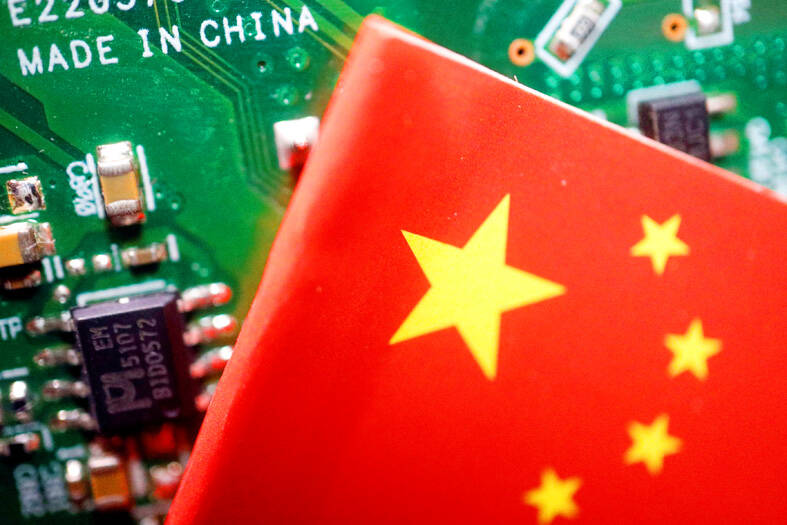Amendments to the National Security Act (國家安全法) imposing harsher punishments for “economic espionage” and “extraterritorial use of national core key technologies’ trade secrets,” which were passed last year, have taken effect, with offenders facing up to 12 years in prison, the Executive Yuan announced yesterday.
The revisions took effect following the National Science and Technology Council’s release on Tuesday last week of a list of 22 national core key technologies.
To protect Taiwan’s high-tech industries, the Legislative Yuan passed a third reading of the amendments to the National Security Act in May last year.

Photo: Reuters
With their implementation being delayed for more than a year, the Taiwan Statebuilding Party held a news conference calling for their enactment.
The 22 national core key technologies listed by the council cover five industries: national defense, aerospace, agriculture, semiconductors and information security.
The core key technologies include eight types of technologies in the aerospace industry, and 14-nanometer and more advanced semiconductor processes and heterogeneous integrated packaging technology in the chip industry.
The council is expected to release a second list of national core key technologies in March or April next year.
The amendments impose stiffer penalties for those who help China, Hong Kong, Macau or foreign hostile forces obtain, use, or leak trade secrets of Taiwan’s core key technologies, through theft, cheating, coercion or reproduction without authorization.
Offenders may face five to 12 years in prison or a fine of NT$5 million to NT$100 million (US$158,670 to US$3.17 million).
People convicted of economic espionage may face the same punishments, with the amendments defining three types of criminal behavior: knowing or holding trade secrets of national core key technologies, but reproducing, using or leaking them beyond the scope of authorization or without authorization; holding trade secrets of national core key technologies despite being informed by the owner to delete or destroy them; and being fully aware that other people obtained trade secrets of national core key technologies through the situations stated above, but still obtaining, using or leaking the trade secrets.
The “extraterritorial use of national core key technologies’ trade secrets” refers to the illegal use of trade secrets of national core key technologies in China, Hong Kong, Macau or other countries. Offenders may face three to 10 years in prison or a fine of NT$5 million to NT$50 million. Those found guilty of attempting to commit such acts would also be punished.
The amendments also stipulate that current or retired military officials, civil servants, educators, or public-sector employees who commit such acts would lose their rights to retirement benefits, while those who have received them would be asked to pay the amount back.
In other developments, Minister of National Defense Chiu Kuo-cheng (邱國正) said allegations that National Defense University professor Ger Ming-der(葛明德) had set up a company that conducts technical cooperations with China would be a case of “betraying the country.”
It would be considered treason and should be dealt with according to the law and severely punished, he said in response to lawmakers’ queries at a meeting of the legislature’s Foreign Affairs and National Defense Committee.
The Ministry of National Defense would also engage in introspection over the case, Chiu said, adding that an administrative investigation is underway.
Additional reporting by staff writer

CHAOS: Iranians took to the streets playing celebratory music after reports of Khamenei’s death on Saturday, while mourners also gathered in Tehran yesterday Iranian Supreme Leader Ayatollah Ali Khamenei was killed in a major attack on Iran launched by Israel and the US, throwing the future of the Islamic republic into doubt and raising the risk of regional instability. Iranian state television and the state-run IRNA news agency announced the 86-year-old’s death early yesterday. US President Donald Trump said it gave Iranians their “greatest chance” to “take back” their country. The announcements came after a joint US and Israeli aerial bombardment that targeted Iranian military and governmental sites. Trump said the “heavy and pinpoint bombing” would continue through the week or as long

TRUST: The KMT said it respected the US’ timing and considerations, and hoped it would continue to honor its commitments to helping Taiwan bolster its defenses and deterrence US President Donald Trump is delaying a multibillion-dollar arms sale to Taiwan to ensure his visit to Beijing is successful, a New York Times report said. The weapons sales package has stalled in the US Department of State, the report said, citing US officials it did not identify. The White House has told agencies not to push forward ahead of Trump’s meeting with Chinese President Xi Jinping (習近平), it said. The two last month held a phone call to discuss trade and geopolitical flashpoints ahead of the summit. Xi raised the Taiwan issue and urged the US to handle arms sales to

State-run CPC Corp, Taiwan (CPC, 台灣中油) yesterday said that it had confirmed on Saturday night with its liquefied natural gas (LNG) and crude oil suppliers that shipments are proceeding as scheduled and that domestic supplies remain unaffected. The CPC yesterday announced the gasoline and diesel prices will rise by NT$0.2 and NT$0.4 per liter, respectively, starting Monday, citing Middle East tensions and blizzards in the eastern United States. CPC also iterated it has been reducing the proportion of crude oil imports from the Middle East and diversifying its supply sources in the past few years in response to geopolitical risks, expanding

Pro-democracy media tycoon Jimmy Lai’s (黎智英) fraud conviction and prison sentence were yesterday overturned by a Hong Kong court, in a surprise legal decision that comes soon after Lai was jailed for 20 years on a separate national security charge. Judges Jeremy Poon (潘兆初), Anthea Pang (彭寶琴) and Derek Pang (彭偉昌) said in the judgement that they allowed the appeal from Lai, and another defendant in the case, to proceed, as a lower court judge had “erred.” “The Court of Appeal gave them leave to appeal against their conviction, allowed their appeals, quashed the convictions and set aside the sentences,” the judges